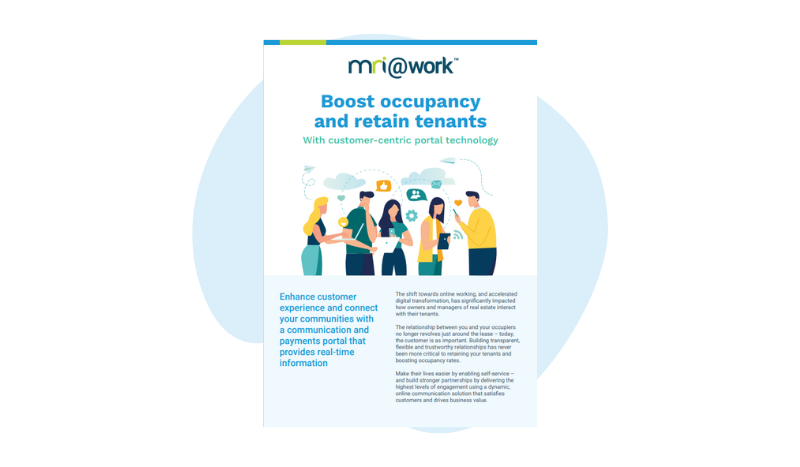Resident communications in the age of COVID-19
Resident communications have been top of mind for most multifamily property organizations lately. As the COVID-19 crisis continues to evolve, communication between property management and residents is of the utmost importance. At MRI Software, our Callmax Automated Communications suite experienced a 30% increase in the volume of communications sent in the third week of March, as compared to a normal mid-month week.
Looking at March 19th in particular, nearly all of the communications were related in some way to COVID-19. A few common themes emerged as well, which I’ve outlined below along with best practice recommendations.
Office closures and impacts
As you might expect, leasing offices are closing as “social distancing” is being encouraged globally. Face-to-face interactions are stopping. For some properties, an office closure notice was frank and brief. For others, additional information was provided, including mandatory audio, digital and virtual communications, and making it clear when the office would be open virtually.
Many properties are encouraging the use of a resident portal as a communication channel to handle payments and service requests. One even reminded folks that it is okay to “slide a check or money order under the door.”
Best Practices: Over-communication is okay, especially as it relates to details about changing operational processes and services. Clearly state your hours. Clearly state how to get in touch with staff. Set expectations and be available (virtually) for your residents. Drive residents to online services and portals. Really encourage electronic payments to avoid check handling processes. Remind residents how to establish their portal accounts and setup online payments (one-time or recurring).
Package handling
As offices close, many are telling residents that they will no longer be accepting packages. In many cases, this practice represents a very impactful change to residents’ current and evolving expectations given the following:
- Residents will turn to online retail as a means of social distancing
- With more residents working from home, the option for office delivery is removed, driving additional volume to apartment communities
- Amazon is currently hiring 100,000 additional employees to deal with increased demand
Taken together, it is clear that properties are in for a substantial increase in package volume, even though some are starting to refuse packages and require carriers to deliver to doorsteps. Package lockers will remain available but will need regular cleaning. Some are closing package rooms, some are remaining open.
An increase in package volume, coupled with the need for carriers to go door to door, will create slower deliveries as drivers spend significantly more time at a property delivering packages that were once left at the office, putting more drag on the overall delivery supply chain.
Best Practices: Consider a scheduled pickup process where packages are received in the office and, based on an arrangement with the resident, placed in a specific location at a specific time to allow for pick up while still keeping social distance. Also, consider a door-to-door package delivery service to reduce traffic onsite. Regularly clean package rooms, lockers and package transit points per current guidelines.
Maintenance and inspections
Largely, maintenance activities are moving to emergency activities only. Preventive measures, like pest control, are being cancelled, as are inspections.
Best Practices: Clearly define what constitutes an emergency and what does not. Notes about how to manage social distancing in the event of an emergency (sick resident in the other room) and other expectations (maintenance staff will be wearing protective gear and will wipe all surfaces) are encouraged. Remind residents how they can control pests (glass cleaner kills ants).
Amenities and events
Amenity spaces are largely closing, especially non-essential indoor facilities. Laundry facilities remain open and will be cleaned per current guidelines. Business centers are closing. Resident events are cancelled. Outdoor space treatment varies as some are closing dog parks and other open space while others remain open with strong social distancing guidelines.
Best Practices: Keep open spaces open and encourage social distancing. Provide an abundance of pet litter bags and reminders to help keep the space clean. For events: Get creative. Think balcony bingo or patio happy hour, keeping the community together while respecting social distancing. All you need is a speaker, a megaphone, and some creativity.
Rents, renewals and other payments
Since we are in the middle of the month, there aren’t many communications regarding rent and late fees being sent, but some logistical messages may be required. On a more negative tone, you may have to send notices about rent not being accepted if there is a balance due. You might also need to update some residents regarding existing eviction processes. In general, however, properties should be prepared for “business as usual” approaches to be challenged in the short term as conditions evolve and policies change.
On a more positive note, recognizing changing conditions, some have chosen to contact residents on month-to-month terms, offering to formalize an extension. Similarly, residents who had given notice were offered the ability to retract it and renew at competitive rates.
Best Practices: Be prepared for residents who present with economic hardships. Revisit payment plans, break clauses and other options to help residents while they sort out their personal financial situation. Where possible, leverage online renewal technology to keep residents in place while also practicing social distancing.
Reminders, resources and recurring messages
Reminders may be necessary for residents who are acclimating to being onsite full time, such as those who are working from home. These messages should cover a broad array of topics including reminders on smoking policies, a refresh on trash pickup practices, or a note to electric car users to rotate their vehicle out of the charging stations so everyone can use them. All are useful reminders and good ways to maintain engagement.
Some property managers have gone so far as to offer resources for homeschooling, updates on how to get food and rental assistance, and even providing lunches for kids now at home instead of school.
Some standard notices, however, may not be appropriate for the time being. Specific examples would include a bubbly March birthday message or a renewal raffle for a new flat screen TV. These would likely need attention before the scheduled message was sent.
Best Practices: Review any recurring messages to ensure the content remains appropriate given current conditions. Look for opportunities to provide your residents with information and resources that they will find useful during this period of social distancing and economic unrest.
Leasing activity
As you might expect, there has not been much communication to prospects regarding the many changes described above. When addressing prospects, properties are making it clear that tours can be available by appointment only. There is also encouragement to utilize digital tools to virtually tour units.
Best Practices: Leverage digital tools for appointment scheduling, touring and online leasing to maintain social distance while working to continue the leasing process.
Looking at how fast things have changed in just one week shows how important communications are, and how property managers can utilize best practices for improved communications going forward as the impact of COVID-19 on multifamily organizations continues.
“The way we communicate with others and with ourselves ultimately determines the quality of our lives.” -Tony Robbins
MRI Engage for @Work Brochure
Enhance customer experience and connect your communities with a communication and payments portal that provides real-time information The shift towards online working, and accelerated digital transformation, has significantly impacted how owners and …

